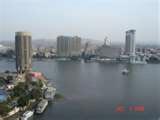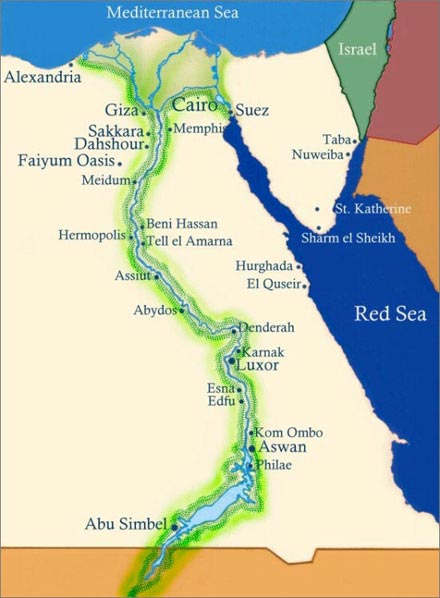|
|
|
|
|
|
 |
Members Sign In
|
 |
|
|
|
|
|
|
|
|
|
|
|
|
Egypt:
Egypt located in the center of the Middle East, and is considered as the trading hub between the Middle East, Africa and the rest of the world, Geography, population, history, military strength, and diplomatic expertise give Egypt extensive political and economic influence in the Middle East. Cairo has been always the crossroad of Arab-African and international commerce and culture.
With more than 80 million, Egypt's population is the largest in the Arab world, and is generally young, with 35 percent below age 14 and just 4 percent older than 65. Today, Egypt is primarily a free-market economy with some state control. The economy's main exports are crude oil and petroleum products, cotton, textiles, metal products, and chemicals. Agriculture today accounts for 17 percent of GDP, industry for another 32 percent, while the services sector provides 51 percent, thanks to the growing population; the country has one of the highest overall purchasing powers.
Market Information:
The government of Egypt made it a top priority to develop the country’s infrastructure, including roads, facilities, ports and a modern communication network in its drive to achieve political diversification and attract foreign investment as well as effectively contribute to the diversification of the Gross National Product.
With the installation of the 2004 Egyptian parliament, the Government of Egypt began a new reform movement, following a stalled economic reform program begun in 1991, but moribund since the mid-1990s.
In the past year, the cabinet economic team has simplified and reduced tariffs and taxes, improved the transparency of the national budget, revived stalled privatizations of public enterprises and implemented economic legislation designed to foster private sector-driven economic growth and improve Egypt's competitiveness.
Country Fact Sheet – Egypt:
Population (July 2007 est.): 80,335,036
Annual growth rate (2007 est.): 1.72%
GDP (2007 est.): $118-120 billion
Annual growth rate (2007 est.): 7.2%
Per capita GDP (2007 est.): $5,400
No. of new established companies in 2007: 5958 companies
The Foreign Direct Investments to Egypt in 2007: 11.1 billion compared to US$, 2.1 in 2004
30% of the total FDI to Africa
Private Investments in Egypt increased by 40% in the year 2007
1148 Companies expanded their business in 2007
The most developed sectors are Industrial and ICT sector
Location:
Egypt is situated in northern Africa, bordering the Mediterranean Sea. Libya is on its western border and the Gaza Strip and the Red Sea makes up the eastern border. The Sudan lies on Egypt's southern border.
Land Boundaries:
Gaza Strip 11 km, Israel 266 km, Libya 1,115 km and the Sudan 1,273 km.
Geography:
Egypt covers 95,450 sq km, slightly more than three times the size of New Mexico, US. It has a desert climate with hot, dry summers and moderate winters. The country is basically a vast desert plateau interrupted by the Nile valley and delta. Its lowest point is at the Qattara Depression -133 m, and the highest point is Mount Catherine at 2,629 m. Natural hazards that afflict the country are: Periodic droughts, frequent earthquakes, flash floods, landslides and a hot, driving windstorm called khamsin which occurs in the spring.
Egypt controls the Sinai Peninsula and the Suez Canal, a sea link between Indian Ocean and Mediterranean Sea. Its size and juxtaposition to Israel establish its major role in Middle Eastern geopolitics.
Population:
More than 76 million people live in Egypt. Life expectancy is around 70 years. Birth rate is on average 2.95 per woman. Literacy rate is 68% for men and only 47% for women.
Languages:
Arabic (official), English and French widely understood by educated classes.
Ethnic Groups:
Eastern Hamitic stock (Egyptians, Bedouins, and Berbers) 99%. Greek, Nubian, Armenian and other European (primarily Italian and French) 1%.
Religion:
Muslim (mostly Sunni) 94%, Coptic Christian and other 6%.
A Quick History:
The regularity and richness of the annual Nile River flood, coupled with semi-isolation provided by deserts to the east and west, allowed for the development of one of the world's great civilizations. A unified kingdom arose circa 3200 B.C. and a series of dynasties ruled in Egypt for the next three millennia. The last native dynasty fell to the Persians in 341 B.C., who in turn were replaced by the Greeks, Romans, and Byzantines. It was the Arabs who introduced Islam and the Arabic language in the 7th century and who ruled for the next six centuries. A local military caste, the Mamluks took control about 1250 and continued to govern after the conquest of Egypt by the Ottoman Turks in 1517. Following the completion of the Suez Canal in 1869, Egypt became an important world transportation hub, but also fell heavily into debt. Ostensibly to protect its investments, Britain seized control of Egypt's government in 1882, but nominal allegiance to the Ottoman Empire continued until 1914. Partially independent from the UK in 1922, Egypt acquired full sovereignty following World War II. The completion of the Aswan High Dam in 1971 and the resultant Lake Nasser have altered the time-honored place of the Nile River in the agriculture and ecology of Egypt. A rapidly growing population (the largest in the Arab world), limited arable land, and dependence on the Nile all continue to overtax resources and stress society. The government has struggled to ready the economy for the new millennium through economic reform and massive investment in communications and physical infrastructure.
Economic Overview:
Lack of substantial progress on economic reform since the mid 1990s has limited foreign direct investment in Egypt and kept annual GDP growth in the range of 2-3 percent in 2001-03. Egyptian officials in late 2003 and early 2004 proposed new privatization and customs reform measures, but the government is likely to pursue these initiatives cautiously and gradually to avoid a public backlash over potential inflation or layoffs associated with the reforms. Monetary pressures on an overvalued Egyptian pound led the government to float the currency in January 2003, leading to a sharp drop in its value and consequent inflationary pressure. The existence of a black market for hard currency is evidence that the government continues to influence the official exchange rate offered in banks. In September 2003, Egyptian officials increased subsidies on basic foodstuffs, helping to calm a frustrated public but widening an already deep budget deficit. Egypt's balance-of-payments position was not hurt by the war in Iraq in 2003, as tourism and Suez Canal revenues fared well. The development of an export market for natural gas is a bright spot for future growth prospects, but improvement in the capital-intensive hydrocarbons sector does little to reduce Egypt's persistent unemployment. |
|


 |
 |
|
|
|
|
|
|